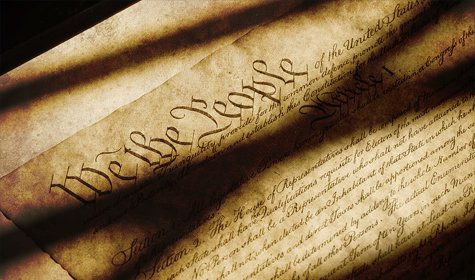When it comes to federal government policy, Americans generally begin the discussion without first answering the most basic question: is this or that federal action authorized by the Constitution?
Federal gun control provides us with the perfect example.
During a PBS Town Hall discussion this week, Pres. Obama assured a gun shop owner that he, Hillary and Democrats in general don’t want to take away folks’ guns. They just want to enforce “common sense” gun control measures.
“So, sir, I just have to say, respectfully, that there is a way for us to have common sense gun laws. There is a way for us to make sure that lawful, responsible gun owners like yourself are able to use them for sporting, hunting, protecting yourself, but the only way we’re going to do that is if we don’t have a situation in which anything that is proposed is viewed as some tyrannical destruction of the Second Amendment. And that’s how the issue too often gets framed.”
Who can object to “common sense,” right? And for most Americans, the discussion begins and ends right there. The gun control lobby wants to paint anybody who challenges their agenda as opposing “common sense,” and the supporters of organizations like the NRA want to convince you some specific proposed gun control measures aren’t reasonable.
Rarely does anybody ever bring up the more basic question: does the federal government have the constitutional authority to enforce any gun control in the first place – common sense or otherwise? If not, debating the reasonableness of any given proposal becomes utterly irrelevant.
Before you can even consider whether the federal government should do something, you must determine whether it can do something legally under the Constitution. If not, the federal government should not act, no matter how common sense or beneficial the action may be.
During the Virginia ratifying convention, delegate Henry Lee alluded to the importance of this “first question” during debates on federal power.
“When a question arises with respect to the legality of any power, exercised or assumed by Congress, it is plain on the side of the governed. Is it enumerated in the Constitution? If it be, it is legal and just. It is otherwise arbitrary and unconstitutional.”
So, let’s explore the question: does the federal government have any authority to enforce common sense gun control?
No.
No more than it has any authority to confiscate guns. In fact, any federal law regulating firearms is in fact a “tyrannical destruction of the Second Amendment.”
“…the right of the people to keep and bear Arms, shall not be infringed.”
Infringe – v: Act so as to limit or undermine (something)? encroach on.
Simply put, any federal government action that limits the right to keep and bear arms in any way whatsoever violates the Second Amendment. This includes whatever actions gun control advocates want to categorize as “common sense.” The Second Amendment establishes absolute prohibition on government action that infringes on the right to keep and bear arms – even the common sense action. Any federal gun control crosses the constitutional line in the sand. And once the feds take that first step, it erases the line completely.
As North Carolina ratifying convention delegate James Iredell put it, any law “not warranted by the Constitution is a bare-faced usurpation.”
Even if the Second Amendment didn’t exist, the feds still wouldn’t have any authority to enforce gun laws, or to create gun registries, or limit certain kinds of guns, or to exclude certain people from gun ownership. Read through the powers delegated to Congress in Article 1 Section 8. You will find no authority to regulate firearms.
None.
Zero.
Zip.
Nadda.
Americans need to reprioritize the way they look at federal actions. Not just relating to guns – every federal action. They need to ask the first question first: Is whatever I think the feds should do authorized by the Constitution?
If not, it shouldn’t be done.
Period.
The Tenth Amendment Center is a national think tank that works to preserve and protect the principles of strictly limited government through information, education, and activism. The center serves as a forum for the study and exploration of state and individual sovereignty issues, focusing primarily on the decentralization of federal government power as required by the Constitution. This article originally appeared at: http://tenthamendmentcenter.com/2016/06/05/on-every-federal-policy-answer-the-first-question-first/

